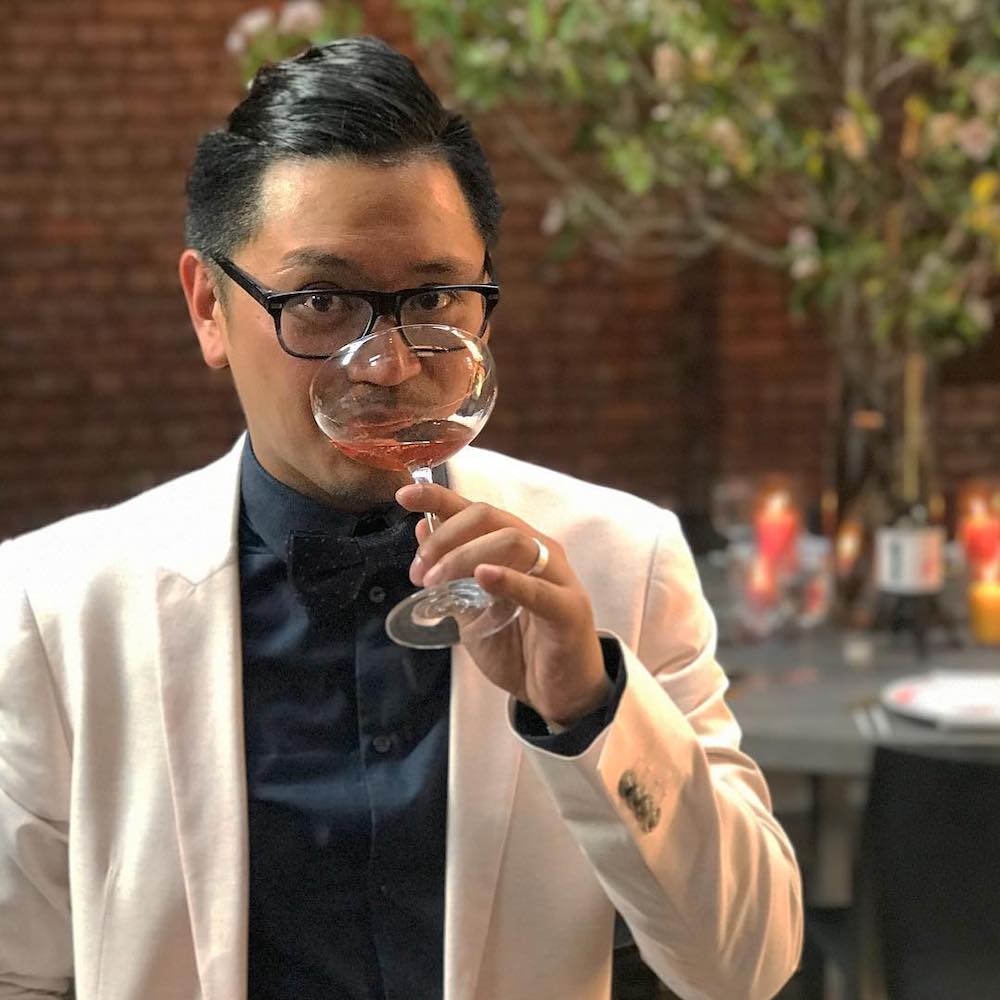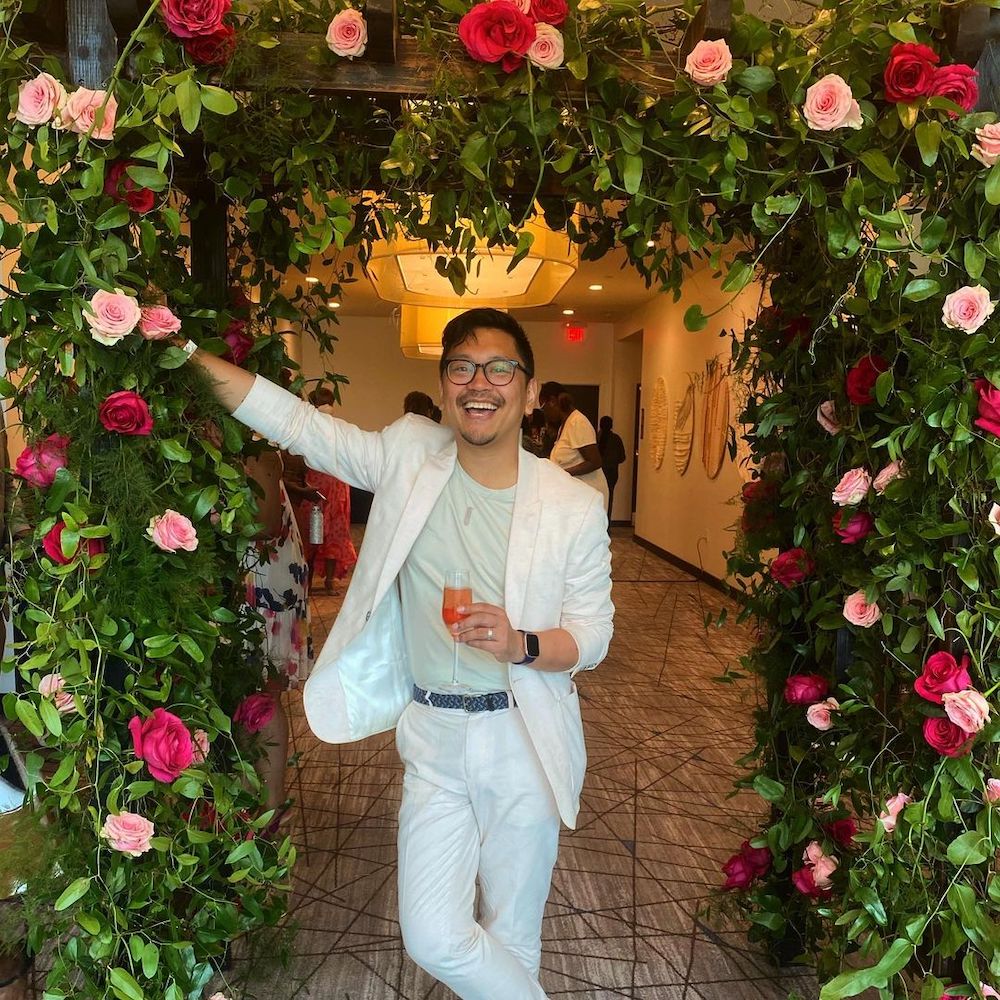An essay penned by New York-based Filipino sommelier Miguel de Leon recently won the prestigious James Beard Foundation Journalism Award, widely regarded as the Oscars of the food industry.
Written soon after the killing of African-American George Floyd in May 2020, which sparked the Black Lives Matter movement, the impassioned piece relates the prevailing racism in America to De Leon’s personal journey as a Filipino sommelier.
In the essay, entitled “It’s Time to Decolonize Wine” and written for online magazine Punch, the Filipino wine expert—who was named New York Sommelier of the Year in 2021—talked about the “white supremacy” in the wine universe, about being identified as “a very different kind of Asian,” a brown person seeking legitimacy in the wine space, and about the inherent shame or hiyâ in Filipino culture. “The generations before us couldn’t bear to be proud of who we were because of the fear of upsetting the group’s status with white people, whether it was the Spanish or the Americans,” De Leon wrote.
We caught up with the 37-year-old De Leon recently to get to know the guy—he moved to the US at 10 years old, was a “batang kalye” in Caloocan before that, and his lolas were kind of his first teachers in the nuances of food—and he talked to us about his journey as a sommelier in the US, how he continues to connect to his heritage with his lolas now gone, and why he can never turn off being kayumanggi.
“I moved here to this country because I want to stake my claim in this space that's going to give me way more opportunity,” he says firmly. “My Filipinoness is the only way that I understand how to navigate in this space. When people say you need to leave your baggage at the door. I can't.”
Ladies and gentlemen, James Beard awardee Miguel de Leon.
You wrote a very thoughtful and poignant piece about your experience as a Filipino sommelier in a white-dominated field. How long did it take you to write it?
It took me two hours to write that because it was a very clear, different Asian experience. It stemmed from a lot of places. When I moved to the US—despite me growing up in the Philippines and understanding how Filipino I was—there were people basically telling me that I wasn't Filipino enough in the American sensibility. Like, I didn't dance hip hop or listen to black music when I was growing up.
In the mid-‘90s, which was when I moved to the US, it was a very different time in the Philippines. It was right after [Fidel] Ramos was elected [to the presidency]. Martial Law was still fresh in people's minds, and what the newfound version of our independence or our definitions of being a Filipino would look like. I carried those with me. There was a very different way of understanding or presenting yourself as a Filipino person in the global aspect.
You mentioned that your essay was triggered by the death of George Floyd and the rise of the Black Lives Matter movement.
Yes. I'm a Filipino but that's also something that's kind of intertwined with the Black experience. Our liberations are intertwined, at least in this country. We saw it all happen in the 1960s through civil rights movements and things like that. But even the 1910s, we were seeing it with Filipinos in the Bay Area. So I'm keenly aware about our shared histories of being discriminated against, being thought of as other people, as a different group of people that were taking other people's jobs.
So for me to be able to say, we all fit in the spectrum of Americanness, that’s great. I'm happy that what I'm doing isn’t undermining the sense of Filipino pride. I'm very proud to be a Filipino. But I'm the only person who gets to define my own relationship with my own Filipino-ness. I feel like there's a big divide between people who have stayed in the Philippines versus émigrés. So for me, it's not about trying to prove that I'm Filipino enough. I'm trying to prove that Filipinos can exist on a very big spectrum and I'm one of the people who’s helping to define what that spectrum can look like.
The James Beard award is a pretty big thing. What does it mean to you as a Filipino sommelier?
It's a really big thing. First off, as a Filipino person, we've legitimized this job as something that you can dream of and aspire for. So that's a defining thing for me. It's not just being a nurse, an architect, an engineer, or a lawyer. Working in restaurants is just as prestigious.
It’s also about spreading our Filipino-ness, how we grew up, and why our tastes are the way that they are. That's a really crucial thing that I get to show to an international audience.
How did you discover the world of wine?
My parents divorced when I was young. So I moved to the US when I was 10 years old. My mom had already been based here prior. I continued my grade school education in Orange County then went to University of California in Berkeley—I studied linguistics and urban planning. At the same time, that’s also when I needed to help pay for everything else. And a restaurant job was the easiest thing for me—I earned good money and I was able to set my own schedule.
It just so happened that I was working at one of the best restaurants in the country called Chez Panisse. It was the best place for me to understand how to learn about wine and food. From then on, wine has always been part of the conversation. And I started taking it super seriously about 11 years ago when I was in New York. Pretty much since then, I just fell in love with everything else about it.
Tell us about your journey as a Filipino sommelier in the US.
It was in 2012 when I got my wine certification here in New York. Then I worked in a Spanish place called Casa Mono, which has one of the best lists of Spanish wines here in the US. From 2017 until now, I’ve been working in a restaurant called Pinch Chinese.
When I think about sommeliership, when I think about wine, it's always in relation to food—whether it’s Filipino, Chinese, Spanish etc. The idea is always how to make [a wine pairing] as delicious as possible.
Sommeliership is hard because alcohol has a different kind of valuation in our culture. Wine is not inherently a part of the Filipino culture. But to be a global Filipino, if our major export is labor, then how come we can't exploit that relationship as Filipinos? For me, let’s celebrate the fact that we can be anywhere. Go to any country, there's going to be a Filipino somewhere, literally—whether or not they're in an OFW capacity or anything else.
One of the biggest things for me was understanding sommeliership, which is already a misunderstood category within restaurant or hospitality spaces. For it to be a rarefied wine thing, and then for you to be called an expert, or be celebrated in this space, my Filipino-ness is telling me to be modest about it. But my American side is telling me that it’s something that I should be proud of. So I’m still kind of trying to figure out where the best balance is for me.
How did your childhood experiences in the Philippines develop your palate for food and wine?
Batang kalye ako nung nasa Pilipinas ako. I grew up in Caloocan, malapit sa Monumento. Our barangay was near the wet market. MCU, Quezon City Circle, Ateneo’s Katipunan campus—those were the places that I spent the most time in, and also the places where I learned about Filipino food and flavors. Up to Grades 3 and 4, I was learning about Home Economics in Ateneo. They taught us very Filipino things to cook—eggs, pastillas and polvoron.
But at the same time, I would go with my lola to the palengke a lot. I understood what wet market looked like, how to choose fish, or what kind of vegetables to buy. One of my grandmothers is from Pampanga, the other one is from Bulacan, so that must have contributed to calibrating my palate.
I grew up with burong isda, which is one of my favorite dishes to eat. But you can barely find that here sa US so I'll have to rely on my grandmother's recipes, since she has passed. So those things allow me to connect with my heritage.
So if I'm having a dinner party at a friend's house or kind of showing people this is the food that brings me places—it's always Filipino food. And it's because the flavor brings me back to a very specific version of how I grew up and the version of how that keeps me comfortable.
Do you make a conscious effort to distinguish yourself as a Filipino in your field?
Yes, of course. If you look on my bio on Instagram—there’s a Filipino flag, an American flag, and a rainbow flag. Marunong pa rin akong mag-Tagalog, and that's a really big deal for me. My spiritual core is still—I'm Filipino first. I don't call myself a Filipino-American person. I'm a Filipino person. I'm an immigrant. I moved here to this country because I want to stake my claim in this space that's going to give me way more opportunity.
My Filipinoness is the only way that I understand how to navigate in this space. When people say you need to leave your baggage at the door. I can't. I can't turn being kayumanggi off.
What would you advise Filipinos who would like to establish a career as a sommelier?
Drink as much wine as you want to. Drink what you like. Understand that Filipino cuisine has been influenced by the globe for centuries—so that's something that you can use as a superpower. We Filipinos love to use condiments to customize our meal. We love suka, patis, toyo etc. We can think about wine in the same way. Wine is a flavor agent. It's something that gives us joy if we do it right for the people around us.
Wine bottles are meant to be shared. Filipinos love to share. We're known for our warmth and hospitality. But also a lack of imagination or innovation thinking what Filipino food can look like—kasi we’re so enamored by the idea of sticking to how our moms or lolas make certain foods. If we want to honor our heritage and culture, we need to think about the Filipino food in a global context because we're global citizens now. Wine is an interesting tool for us Filipinos to take control of our destiny in the global market.
Alam ko sinabi ni Rizal na lumingon tayo sa pinanggalingan natin. But the second half of that is let's look to the future. That’s what I’m looking at in terms of wine. If Japanese, Korean, Thai, and Chinese food can be considered top-tier food, let's go there. We have to find the right ways to communicate with each other to get to that point. Passion can only get us so far, but community building can get us to a really different place.
[Photos from Miguel de Leon's Instagram account]





